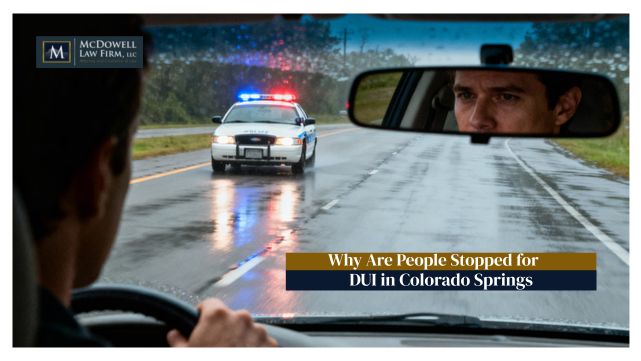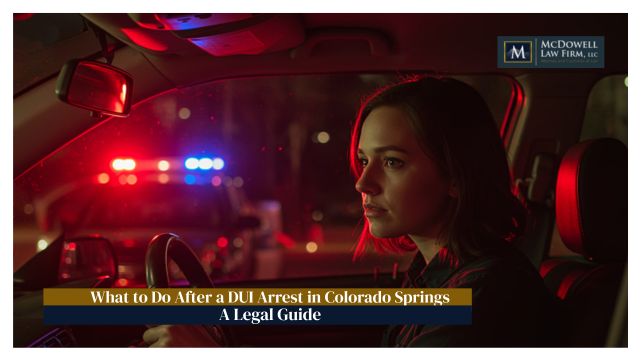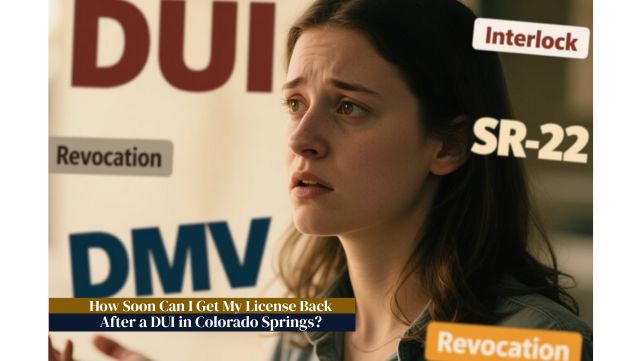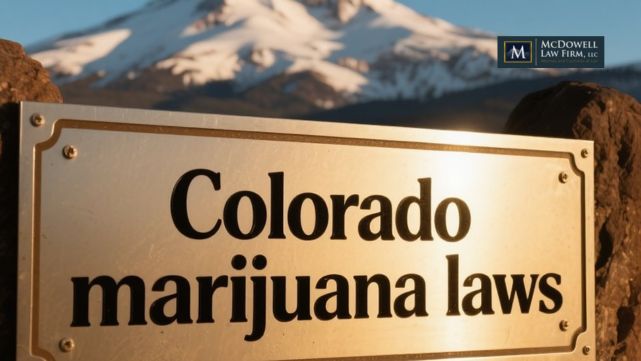Driving under restraint, suspension or denial are some of the most common type of traffic cases we handle at the McDowell Law Firm. They are so common because there are so many ways to lose your license in Colorado.
What is Driving Under Restraint in Colorado?
Driving Under Restraint (DUR) or Driving Under Suspension (DUS) in Colorado means the Colorado DMV has taken away your driver’s license for a number of reasons. The most common type of suspended/revoked licenses we see are for: alcohol-related (DUI, DWAI, DUI per se), point suspensions, out of state violators, and OJW suspensions. For reference, please see Colorado Revised Statutes §42-2-138.
Common Reasons for License Restraint in Colorado
Alcohol Related Revocations
Alcohol-related revocations can occur in two main ways. The first is from an administrative per se hearing at the DMV. The second is by pleading to a DUI or having a combination of prior DUI/DWAI offenses.
If you are charged with Drunk Driving in Colorado and your BAC is a .08 or greater of breath alcohol, or you refuse to consent to a chemical test, you will be served with an express consent notice and affidavit by the police officer at the time of the offense.
The officer will also take your license and notify you that you have 7 days to request an administrative hearing through the DMV. If you do a blood test, you will have more time before you are notified, as your blood must be tested, and be a .08 or greater for the DMV to take action. This notice will come by mail to your address on file with the Department of Revenue.
If you “lose” at the DMV per se hearing your license you will be suspended for 9 months. Keep in mind, in most situations you are eligible for same day reinstatement with an interlock device and certain other conditions.
You will be required to keep the interlock on your car for between 9 months and 2 years depending on your BAC. If you refused a chemical test, the “no driving period” will be 2 months, and the interlock will be required for 2 years. DO NOT DRIVE during this period of revocation as the penalties can be serious.
Driving Under restraint for an alcohol-related reason (also called “DUR-alc”) is a Class 2 misdemeanor traffic offense and carries a 10-90 days jail sentence. It will also re-revoke your license for an additional year.
A second conviction for DUR-alc within 5 years also carries 10-90 days jail, but it can cause a loss of license for four years.
The second way to get a DUR-alc suspension in Colorado is by pleading guilty to a drunk driving offense in court. If you plead to a DUI it will result in a direct revocation of your license. If you are convicted of 2 alcohol-related offenses within 5 years (also called 2DD) you will be revoked as well.
If you are convicted of 3 or more DUIs/DWAIs in a lifetime (3DD) you will also receive a revocation period. A first time DUI conviction requires 9 months of interlock. The 2DD and 3DD revocations require 2 years of interlock.
The Alcohol-related suspensions in Colorado are very complex and can have serious consequences like jail time, high fines, and additional suspensions on your license. If you are facing a DUI, DWAI, DUID, or DUR-alc, please speak with an experienced Colorado DUR lawyer for advice on your specific situation.
Point suspensions
The Department of Motor vehicles may suspend your license for a maximum of one year if you accumulate too many points in a period of time. Points in Colorado result from traffic infractions of traffic misdemeanors.
Some common offenses are speeding 10-19 MPH over the speed limit: 4 points, Careless Driving: 4 points, Reckless Driving: 8 points, Leaving the scene of an accident: 12 points.
How many points will suspend a Colorado Driver?
For drivers over the age of 21, if you receive a total of 12 points or more in a 12 month period, or 18 points or greater in a 24 month period, you will face a suspension of your license.
Underage drivers have less points to work with. Minor drivers 17 years and younger will be suspended with 6 or more points in a 12 month period or a total of 7 points before their 18th birthday.
Minor drivers in the 18 through 21 category, will be suspended if they obtain 9 points with any 12 months, 12 or more points within 24 months, and 14 points between the ages of 18 and 21.
Two important points to remember: 1) traffic points in Colorado date back to the date of offense, not the date you plead. 2) Points are calculated in a rolling 12 month period of consecutive months, not in a calendar year.
If you hit the required number of points you will receive a suspension, but the length of the suspension can vary at the discretion of the DMV hearing officer. This depends on aggravating and mitigating factors in your case.
Can I get a Red license? On point suspension cases, you are eligible for a provisional driver’s license, commonly called a “red license” in Colorado. They are called “red licenses” because the license will have a red stripe on it indicating that it is a provisional license with restrictions.
The red license is given at the discretion of the hearing officer at a point suspension hearing. It will have specific allowances for limited driving purposes. These typically include things like to and from work or school, doctors’ appointments, etc. Remember, police officers have access to the DMV and if you are stopped with a red license you must be within your acceptable purposes.
Out of State/Non-resident violators
People are often suspended or revoked in Colorado for something that happened in another State. If you are suspended out of another State for an active warrant, a DUI, failure to pay a ticket or any other number of reasons, Colorado will honor that revocation/suspension.
Meaning, until you clear up the out of State suspension, Colorado will consider you revoked/suspended as well. For example, if you are driving in Colorado, but are suspended out of California, you are still considered to be DUR or DUS under Colorado law.
Even if you are a Colorado resident and never had a license from that State, another State can put a hold on your license. Colorado will make you clear up that hold/suspension before you can be valid in Colorado.
Outstanding Judgement or warrant
If you missed court, (commonly called a “failure to appear” or FTA), the Court may issue a warrant for your arrest and will notify the DMV of an outstanding warrant.
The Court can also notify the DMV of an overdue outstanding judgment-such as unpaid fines, court costs or restitution. These both fall under OJW holds. If you have an OJW hold, the DMV will require a State/Court clearance of the hold before they will reinstate your license.
Usually a small fee of about $30 is required to get a clearance once the outstanding Judgment or warrant is take care of. Driving Under Suspension for an OJW hold is a Traffic Infraction with 3 points and a fine of $15-100.
No Insurance
The Colorado Department of motor vehicles may also suspend your license if you do not have insurance on your car. This typically happens on a police stop when the officer asks to see your license, registration and proof of insurance.
If you are found to not have any of the three items, you can expect to be ticketed it. Failure to provide proof of insurance has a Statutory basis for license suspension. See CRS §42-2-127.7 for Authority to suspend driver’s license-uninsured motorists.
If you are found guilty of no proof of insurance, the DMV may require you to provide proof of a complying insurance policy before they will allow you to reinstate your license. The more times you have no insurance violations, the suspensions will increase in length.
How Do I Reinstate My License in Colorado? – Steps & Requirements
The most important thing to remember is that you have to reinstate your license after a revocation or suspension. It doesn’t just become valid again after the time period of restraint has passed. You need to actively fulfill the State requirements and reinstate your driving privileges. You can reinstate by mail, online or in-person.
Depending on the type of suspension/revocation the DMV will require different conditions to reinstate. For example, in a DUI matter the DMV will require SR-22 insurance, interlock for 9 months to 2 years, proof of Level II alcohol education (or a certificate depending on the BAC), and a $95 reinstatement fee.
To check on your specific requirements, you can go to the DMV’s website and review the process and even upload documents.
Process to Reinstate Driving Privilege.
Can I Get a Red License for My DUI Suspension? Can I Get a Blue License?
In short, a DUI revocation does not allow for a red license. Red licenses, or PDLs, are only available for suspensions, not revocations. For DUIs or alcohol–related cases, if you wish to do early reinstatement of your license, you must install an interlock device in your vehicle(s).
In some alcohol cases, an interlock device is required whether you are doing early reinstatement or not. A restricted license with an interlock provision is often referred to as a “blue license” because it has a blue stripe on the license. This blue stripe indicates to a police officer who pulls you over that you must be in an interlock equipped vehicle to lawfully drive.
If you are stopped while operating a non-interlock equipped vehicle during this required period the police officer will take your license and return it to the DMV. You will also face additional criminal charges for driving a non-interlock equipped vehicle.
Don’t I Have to Know I Was Suspended or Revoked?
Yes, there is a knowledge requirement in the Driving under restraint statute on Colorado. Under CRS §42-2-138(II)(4)(a), “’Knowledge’ means actual knowledge of any restraint from whatever source or knowledge of circumstances sufficient to cause a reasonable person to be aware that such person’s license or privilege to drive was under restraint. ‘Knowledge’ does not mean knowledge of a particular restraint or knowledge of the duration of the restraint.”
A Colorado Court of Appeals case, State v. Boulden, out of Adams County, Colorado was decided in July of 2016 and expounded on the knowledge requirement of the DUR Statute.
The Court in Boulden held that a suspension letter mailed from the DMV without proof of service was not sufficient to establish the “knowledge” requirement under the Statute.
Revocation and Suspension cases in Colorado are complex
Driving under restraint or suspension in Colorado can present many challenges to a person in dealing with criminal charges and the reinstatement of their license. The above information is intended to give a little insight on how the process works, and what to look out for if you’ve been charged with DUR or DUS.
It should not be taken as legal advice for your situation. Only an experienced Colorado attorney can explain your specific situation and how to handle your case. At the McDowell law firm, we have over a decade of experience handling driving under suspension matters in Colorado.
Give me a call at (719)227-0022 to discuss your case, and the specifics of your license situation. We can determine the best course of action to get your license reinstated and handle any criminal charges that you might be facing.






